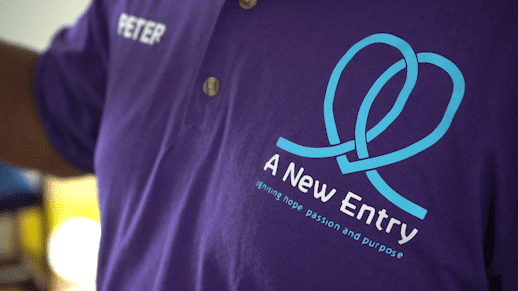Fiercely Focused: A New Entry
AUSTIN (Aug. 31, 2021) — Two decades ago, an unfulfilled Peter Daniels left behind his career in electrical engineering and went back to school to become a licensed clinical social worker. That goal accomplished, he started the nonprofit A New Entry to offer people experiencing homelessness, people who’ve been incarcerated, and people living with chemical dependency a place to work toward their own goals.
“The essential thing is moving them into being fully alive,” Daniels explains. “What are they passionate about? What’s their gift, talent mix? And maybe it’s gone untapped for a while. What needs to be uncovered, recovered, discovered about themselves?”
With a residential treatment program, transitional housing, and recovery supportive housing, A New Entry provides resources to fit an individual’s needs. And unlike traditional treatment programs, a person can stay as long as is necessary to find stable housing so that the organization is not releasing anyone back onto the street.
On this International Overdose Awareness Day, we’re highlighting A New Entry, an organization Fiercely Focused on ending homelessness.
“We do substance abuse treatment, but we also have mental health counselors. We have peer support. We have case management,” says Natasha Burton, Clinical Director at A New Entry. “The incarceration or treatment, everybody’s trying to focus and treat that one thing. But it’s the holistic approach of, like, wraparound services, of getting other things that help them actually get out of this cycle in the system.”
Like many of the people who work at the organization, Burton has a history in her family of the kinds of challenges they’re working to address through programs.
Tina Kelley, A New Entry’s Director of Housing and Intakes, uses her experiences with addiction and homelessness to inform her work connecting people to housing opportunities in the community. It wasn’t until she received an rental voucher through Caritas of Austin that she was able to maintain stability long enough to overcome her substance use.
“I didn’t have to worry about, hey, what do I have to do to get hotel money, to sleep somewhere safe tonight?” Kelley says. “I had an apartment for a year that allowed me to get sober, get a job, and go back to school to better myself.”
This lived experience, Daniels says, is important to making connections with the people they serve. His own life challenges led him to go back to school in the first place all those years ago.
“I love the concept of therapeutic use of self, right. So we share our stories,” he says. “We tell we tell people where we’ve been and where we’ve gone through.”
Despite facing challenges as an organization, like a lack of funding and having to move twice in the last year, Daniels says the work keeps them moving forward.
“What’s the mission here? The mission is to ignite hope and hunger in the hearts of these men and women to live fully alive,” he says. “It’s like, man, the mission, the vision is greater than these challenges and difficulties.”


